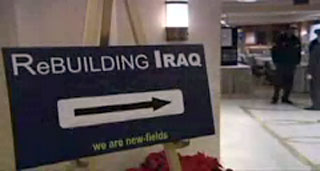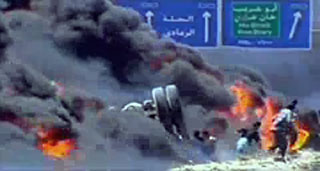

23 September 2004
Like most people who have seen Michael Moore's latest film I am impressed with the amazing skill with which he is able to construct a kind of vernacular argument out of fragments of film, videotape, music, and archival material. Moore's unique film method is that of a reformist, liberal, and mainstream incarnation of that time-proven doco approach, the 'collage essay'.
More esoteric but no less powerful film makers like Craig Baldwin in San Francisco have long used the technique, pioneered by the great beat-era film maker Bruce Conner, where film and video material is collected from a range of sources: archives, donated films, from stuff thrown out from schools and colleges, and mail order sources, to collections and libraries from around the country. The footage is painstakingly watched and material taken based on it's (a) strength visually (b) context narratively and (c) potential as a part in a mosaic.
Moore builds his mosaic up from the fragments to tell a story which goes something like this:
 George W Bush forced himself into office by rigging the 2000 election with the help of his brother, Florida governor Jeb Bush. The willingness of the Democrats in the US senate with Al Gore at the helm to prevent the (largely people of colour) left out of the crucial Florida vote to have their voices heard only made matters worse. With long-standing decades-old big-dollar ties to the oil dynasties of Saudi Arabia, Bush and his cronies were looking for ways to invade oil rich regions of the world to further control oil prices and dominate the world with draconian neo-liberal foreign policy. When Bin Laden's radical Islamist Al Qaeda group staged the surprise attacks on New York and Washington on 9/11 in 2001 they hit major symbolic buildings in the USA with planes as missiles. America had not been hit on its own soil since the British set Washington to the torch in early 19th Century to punish the independence movement.*
George W Bush forced himself into office by rigging the 2000 election with the help of his brother, Florida governor Jeb Bush. The willingness of the Democrats in the US senate with Al Gore at the helm to prevent the (largely people of colour) left out of the crucial Florida vote to have their voices heard only made matters worse. With long-standing decades-old big-dollar ties to the oil dynasties of Saudi Arabia, Bush and his cronies were looking for ways to invade oil rich regions of the world to further control oil prices and dominate the world with draconian neo-liberal foreign policy. When Bin Laden's radical Islamist Al Qaeda group staged the surprise attacks on New York and Washington on 9/11 in 2001 they hit major symbolic buildings in the USA with planes as missiles. America had not been hit on its own soil since the British set Washington to the torch in early 19th Century to punish the independence movement.*
9/11 gave Bush the excuse he needed to implement draconian country-wide crackdowns on freedom of speech, and freedom of expression. Extreme right wing attacks on people of colour, of whom Arab Americans were the main targets started to proliferate. 9/11 gave Bush permission to 'manufacture consent' to attack Afghanistan, then Iraq, and suddenly America's own poorest found themselves dying in a war led by oil profit interests, and only now is America waking up to how they've been conned. The biggest opponents to the war are the warriors themselves, now wise to how they were sold a lemon, namely large scale business ventures dressed up to look like national defence.
 We weave in and out of the ideas on the screen in a mesmeric cascade of events, scenes and commentary. Watching F9/11 is very entertaining and at times disturbing. The cries of the wounded GI screaming 'Save me! Save me!' are horrifying, as are the images of maimed babies and horribly scarred Iraqi children. Here's the truth of war. It is shit - now eat it!
We weave in and out of the ideas on the screen in a mesmeric cascade of events, scenes and commentary. Watching F9/11 is very entertaining and at times disturbing. The cries of the wounded GI screaming 'Save me! Save me!' are horrifying, as are the images of maimed babies and horribly scarred Iraqi children. Here's the truth of war. It is shit - now eat it!
The process of making 'found footage' films is that of collection, fused with the archivists intimate knowledge of actual media fragments and materials. There is formed a kind of 'conversation' with the media at hand. When footage arrives it is sifted through. Moore and his team have carefully examined films from the point of view of their relevance to support the argument and have probably also scoured them for ideas for projects which have not been thought of yet. Within any given 16mm or video sequence can there might be a set of shots that in the right place in the right film can work to reinforce that film's primary argument. Moore's use of materials is masterly, but there are some issues with his argument which irk me.
Why do not more US military personel, surely knowing something of the horrors which await them in Iraq, not simply up and leave for Canada? This was the driving force behind the anti-Vietnam war movement - potential draftees upping and leaving and voting with their feet. Why does not American now build a massive social movement, like the one which stopped the Vietnam war? Why is there not a huge carnival of popular protest to topple Bush and his corrupt oil bandits? I know there are restrictions these days governing the flow of people across places like the Canadian border, but you'd think there would be some sort of much more flamboyant expression of what is so clearly an untenable situation with each passing day.
Why does Moore insist that opposing the war in Iraq is not the same thing as opposing the troops themselves? Most people I know opposed the fact that Iraq was being invaded and had a major issue with Australia's involvement as well. If a war is wrong it should be opposed, whether you wear a uniform or not. The war machinery should be opposed. The tanks, the planes, the troops. This should be especially true in a republic like the United States which is supposed to be made up of the 'will of the people'. The population in republics are supposed to be inseparable from their governing bodies. We the people and all that. The troops themselves should be leading the revolt. In some stories on democracy now, there is the suggestion that this is happening. And Moore himself champions a lone black ex-soldier who refuses to go back to Iraq and 'fight other poor people'. Why cannot now the entire military population follow his lead? Am I being too naively optimistic here?
 So the liberal view that 'the troops are people like us, who like us were misled' is the least convincing argument in the film, and it forms a major structural weakness. It is the entire hierarchical nature of the corrupt oil machine which is at fault and which by wearing the trappings of nation as its cloak, has led Australia, Britain, and the United States into the abyss along with a handful of other small countries which Moore points out in the film (though strangely not including Australia).
So the liberal view that 'the troops are people like us, who like us were misled' is the least convincing argument in the film, and it forms a major structural weakness. It is the entire hierarchical nature of the corrupt oil machine which is at fault and which by wearing the trappings of nation as its cloak, has led Australia, Britain, and the United States into the abyss along with a handful of other small countries which Moore points out in the film (though strangely not including Australia).
National pride and a sense of national service need to come into question as well during war, arguably more than at any other time as Rosa Luxemburg pointed out back during WWII, but Moore wants us to identify with those who 'love their country but not their government'. Fine, but is not the nationalistic impulse itself at least in part, also partly to blame here? Flags, anthems, marching bands and Fox TV - its all of a piece today with McDonnel Douglas, Boeing, Haliburton and the Carlyle Group. Surely opposing one is to oppose them all? Maybe not and I've yet to fully understand the true nature of national pride. But when it leads men and women to their deaths with such ruthless efficiency, something has to be wrong with it. Nation is big business; get it?
Found footage filmmaking is scholarly in that each film puts forward a certain argument or point of view, and reinforces that view by means of allusion, or direct illustration. Many of Michael Moore's films are actually illustrated, carefully scripted vocal narrations. You could very easily just listen to F9/11. It works as radio. The dense soundtrack is made up of different elements, notably music and narration, and the narration has been recorded based on written monologue which itself has been informed by the availability of film and video materials. What is not available is filmed, like interviews etc.
The narration guides the viewer's interpretation of the visual 'evidence'. It's a great approach, and I love his work, even if I don't agree with what I consider mainly to be his liberal, humanist middlebrow point of view. Noam Chomsky and Michael Albert say it much better and more honestly, if with fewer resources and a much smaller budget. But they are anarchists, not left-leaning Democrats.
*[Editor's note: On 26 February 1993 a van, packed with explosives enhanced with cyanide gas, exploded in the parking garage under the World Trade Center killing six people. The group responsible, led by Ramzi Yousef, intended the explosion to destroy both towers by toppling one into the other. It seems there is a national denial that this serious attack ever took place.]
◊